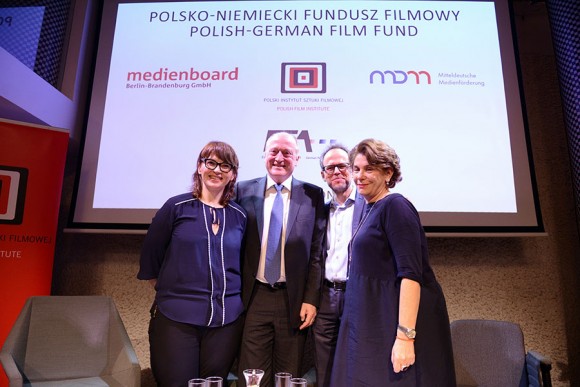As stated by Magdalena Sroka, head of the Polish Film Institute, Kirsten Niehuus, head of
Medienboard, and Claas Danielsen, head of MDM: "Germany and Poland are two nations with
a long and versatile film tradition; films made today in both countries, such as Paweł
Pawlikowski's Ida and Maren Ade's Toni Erdman, gain acclaim around the world. After eleven
years of supporting script development, Polish-German co-productions are now able to seek
support also for the production stage. FFA's participation in the Polish-German Film Fund
means that our cooperation will be fostered on the national level by the German side as well
as the Polish side."
"With the FFA as a new partner, the German-Polish Film Fund, as of now, will be flanked by
the national film funding institutions of both countries. This will give the transnational film
fund a further punch! We look forward to new perspectives alongside the existing partners,
whose successful funding has proved for over more than ten years a strong symbol of the
bonds between the filming industries of both of our countries," says Peter Dinges, head of
Filmförderungsanstalt.
According to Jarosław Sellin, Deputy Minister of Culture and National Heritage, further
growth of the Polish film industry is one of the key priorities of the Ministry of Culture and
National Heritage. "I am glad to see Filmförderungsanstalt join the Polish-German Film Fund,
as this will provide a significant source of financing for film producers making international
coproductions. The Polish-German Film Fund is a good example of cooperation between our
countries in the field of culture," says Sellin.
Dietmar Woidke, Minister President of Brandenburg and coordinator of the Federal
Government for Polish-German cross-border and regional cooperation, says that the FFA
joining the Polish-German Film Fund is "a model example of national responsibility in terms of
cooperation in the field of culture and filmmaking. The film medium is ideal for fostering
mutual understanding. That's why I am very glad that with the accession of
Filmförderungsanstalt the number of supported projects will increase, thus fostering better
understanding by people on both sides of the Oder and Neisse rivers."
The agreement on cooperation within the framework of the Polish-German Film Fund was
signed on 9 December 2016 at the Wrocław 2016 European Capital of Culture Information
Point, on the day preceding the awards ceremony of the 29th European Film Awards.
The Polish-German Film Fund
The Polish-German Film Fund was launched in 2015 and replaced the Polish-German Co-
Development Fund, which had been running since 2005 and focused on supporting
collaborative film projects. It was in 2015 that the heads of the cooperating organisations
decided to increase the fund's budget and to broaden the scope of the Fund to include support
for film production. Within the framework of the Polish-German Film Fund, a film producer
can apply for financing development and production low-budget feature films, films by firsttime
directors, and films with an innovative approach to storytelling.
Over the years, the Polish-German Film Fund (formerly the Polish-German Co-Development
Fund) has financed 33 projects, including films by such acclaimed directors as Agnieszka
Holland (Pokot/Game Count), Robert Schwentke (Der Hauptmann), Marie Nöelle (Marie
Curie), Matthias Luthardt (The Fox), and Robert Gliński (W zwierciadle). The film fund is also
popular among young filmmakers, some of whom have received financing for their projects,
including Kuba Czekaj (Nix), Julian Pörksen (Whatever Happens Next), Agnieszka Zwiefka
(Scars), Marta Minorowicz (Zud), and Mariko Saga (Viet Wander House).
Further details about the Polish-German Film Fund are available from Robert Baliński of the
Polish Film Institute: This email address is being protected from spambots. You need JavaScript enabled to view it., tel. (+48 22) 42 10 387, +48 695 363 398.




















